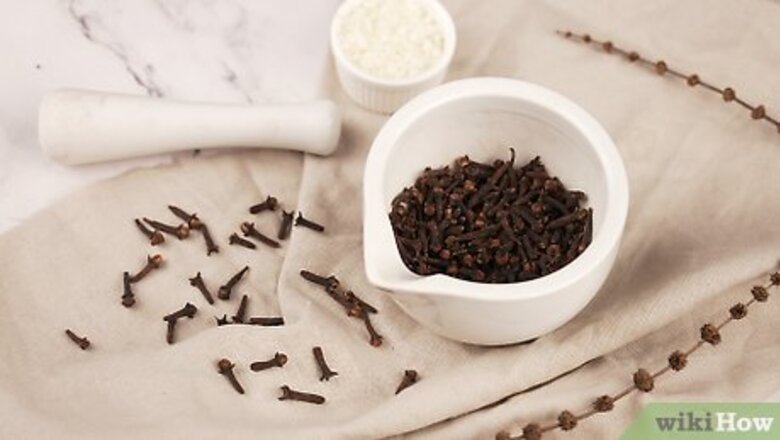
views
X
Trustworthy Source
PubMed Central
Journal archive from the U.S. National Institutes of Health
Go to source
You can buy commercially prepared clove oil anywhere essential oils are sold, but it's also relatively simple to make your own. If you're thinking about using clove oil, mention it to your doctor—they can advise you of any precautions you might need to take, especially if you're taking medication for a chronic health condition.
Follow these 10 steps to make your own clove oil right at home.
Buy fresh whole cloves.
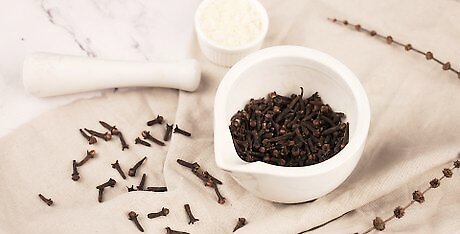
Find fresh whole cloves online or at a grocery store. The eugenol in cloves starts to degrade as they get older, so make sure they're as fresh as you can get for the best results. Dried cloves won't have as much eugenol, so you probably won't get as much of an effect from them. Cloves also come in ground or powdered form, but you won't get as much of the essence out of those, either.
Crush the cloves with a mortar and pestle.
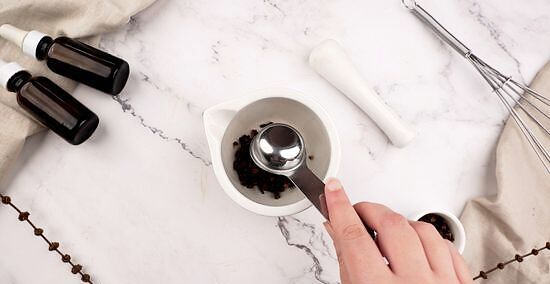
Measure out about 2 tablespoons (about 28 grams) of whole cloves. Put your cloves in a bowl, then crush them gently with a mortar. This helps release the essence from the cloves. Stop when your cloves have a rough consistency. You can also pour a little of the carrier oil you're using (coconut oil, grapeseed oil, and olive oil are good choices) onto the whole cloves before you crush them. This gets the oil thoroughly immersed in the cloves.
Place your cloves in a small dark glass jar.
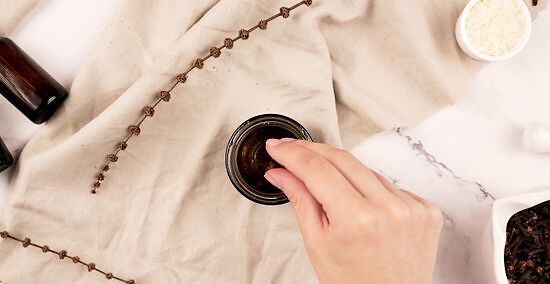
Choose a jar that holds at least 2 to 4 fluid ounces (59 to 118 mL). Dark glass keeps the light from deteriorating the oil. Drop the crushed cloves in the bottom of the jar. You might want to shake them around a little just to make sure they're evenly distributed in the bottom of the jar. Amber- or cobalt-colored glass works well. If you only have a clear glass jar, that's fine—just make sure you're keeping the jar in a place that isn't exposed to light at all.
Cover the cloves with a carrier oil.
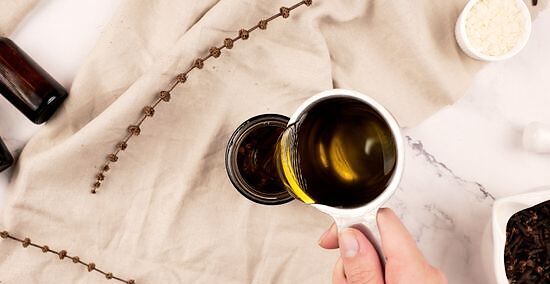
Use coconut oil, grapeseed oil, or olive oil as a carrier oil. Pour the oil over the top of the cloves until they are just submerged under the oil—you won't need much! You might want to shake the jar around a little just to make sure your cloves are covered completely. You can use more carrier oil if you want, but your clove oil won't be as strong.
Seal the jar and shake it gently a couple of times.
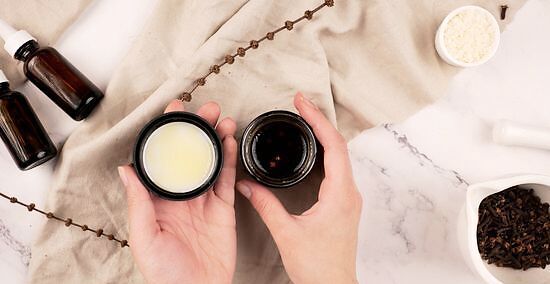
Put the lid on the jar so that it's closed tightly to prevent spills. Shaking the oil and cloves gently ensures that the cloves are completely covered in oil. This also helps distribute the clove essence evenly throughout the bottle of oil. If you're sure the lid is tightly secured, try flipping the jar upside down a couple of times. That way you can be sure that the cloves are completely covered in oil.
Let the jar sit for about a week.
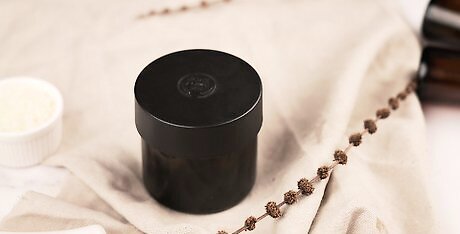
Take the jar out and shake it once a day. Shaking ensures that the clove essence is evenly distributed in the carrier oil. Store the jar in a cool, dark place, such as in the back of the pantry. Technically, your clove oil is ready to use within a couple of days if you need it, but it won't be as potent.
Strain the cloves out of the oil.
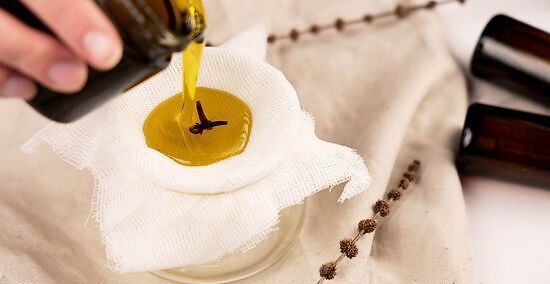
Secure a piece of cheesecloth over the top of the jar with a rubber band. The oil will run through the cheesecloth and leave the solids in the jar. Let the oil drain into a bowl, then pour it right back into the jar once you've removed all the solid pieces. You can leave the cloves in the oil if you want—the oil will just get stronger. However, if the cloves stay in the oil for over a month, add more olive oil before using it so it isn't too potent. It's fine to transfer the clove oil to a different jar as well. A jar with a built-in eyedropper in the lid makes it easier to dispense the oil, but this is entirely optional.
Store the clove oil in a cool, dark place.
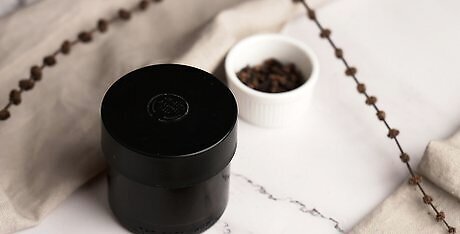
Clove oil keeps for about 4 months. You can still use it after that, but it will gradually lose its potency. For best results, keep your clove oil below 77 °F (25 °C). Light and heat will make it lose its potency more quickly. Refrigerating your clove oil might help it last a little longer, but it isn't necessary.
Apply the oil to gums or skin as needed.
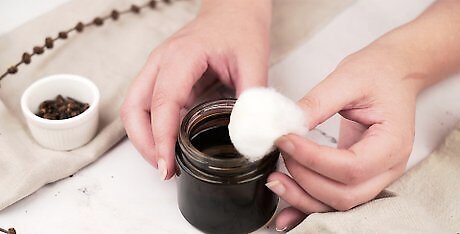
Clove oil is useful to ease pain, relieve inflammation, and repel bugs. Studies have shown that clove oil is helpful in a lot of different ways. Keep in mind these studies all evaluated commercially prepared clove oil—use homemade oil at your own risk with the understanding that it might not have the effect you want! Here are some things you can try: Dab it on your gums with a cotton ball to relieve a toothache. Dot it on your skin at pulse points to repel mosquitos. Rub it on your skin to ease itching or inflammation. Dilute with water and use as a mouthwash to reduce plaque and prevent gingivitis.
Use in small doses to avoid toxicity.
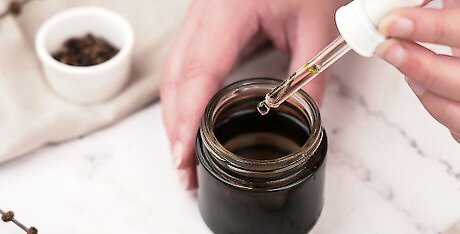
Exposure or ingestion in large amounts can damage the liver and kidneys. If you're only using a drop or two of clove oil at a time, you should be fine. Overdoses involve consuming 10 to 30 millilitres (0.34 to 1.01 fl oz) of clove oil at once, which can lead to a decrease of consciousness and coma in just a few hours. You might also have an allergic reaction to clove oil when you apply it directly to your skin, although this isn't common. If you see a rash after applying clove oil, wash your skin thoroughly with soap and warm water and stop using the clove oil. Babies and children overdose on clove oil much more easily than adults.


















Comments
0 comment